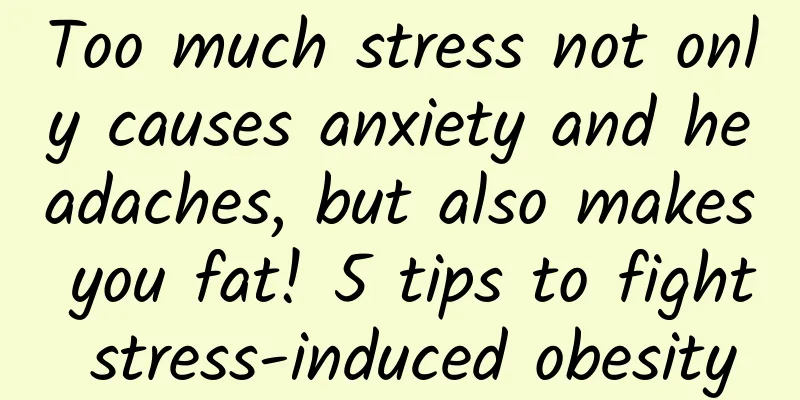Too much stress not only causes anxiety and headaches, but also makes you fat! 5 tips to fight stress-induced obesity

|
Too much stress can not only easily cause anxiety, headaches, and high blood pressure, but it may also make you obese! According to American nutritionists, too much stress can easily slow down metabolism, and too high stress hormones can cause people to eat more unconsciously, so the greater the stress, the more fat they gain! Too much stress may cause many health problemsTime magazine quoted the views of Cynthia Sass, a well-known American nutritionist, who mentioned that too much stress may cause health problems such as headaches, muscle tension, digestive problems, sleep disorders, and depression. However, the latest research has found that stress can also slow down metabolism! In addition, the stress hormone cortisol can increase appetite, make people particularly want to eat junk food, and make it easier for fat to be stored in the abdomen. Since modern people are living in a high-pressure, fast-paced environment, Cynthia Sass also proposed 5 life tips to help fight stress-induced obesity. 5 tips to fight stress-induced obesityTake a deep breath before eating: A recent study from Spain found that relaxed, rhythmic breathing can reduce cortisol levels in the body. Take a few minutes before meals to take a few slow, deep breaths, inhaling through your nose and exhaling through your mouth. This little trick can help relax your muscles and change your mood. Choose good fats: Stress makes it easier to store fat, so you should choose healthier types of fat in your diet, but still remember not to consume too much. Fat is an important element that provides the body with a sense of fullness and is also an essential source of energy for the body. However, in order to consume high-quality fat without burden, it is best for each meal to contain only one high-fat ingredient. For example, if you want to put avocado, which is high in fat, on your salad, you should switch to a red wine vinegar-based dressing instead of an oil-based one. If you want to put high-fat avocado on your salad, then the salad dressing should be changed to a red wine vinegar-based salad dressing instead of an oil-based dressing. Adjusting meal portions: If stress slows down calorie consumption after a meal, you may be able to eat fewer calories and still feel full by adjusting portion sizes. For example, instead of eating 1 bowl of brown rice with 1 bowl of vegetables, it is better to change to half a bowl of brown rice with 1.5 bowls of vegetables. In this way, you can reduce your intake of 60-75 calories. For example, if you want to eat a whole bowl of quinoa, it is better to eat half a bowl, and then take half a bowl of spinach, which will immediately reduce 100 calories. Simply put, cutting out starchy foods (even the healthier types) and switching to low-calorie, high-fiber, water-rich vegetables is a quick way to cut calories without going hungry. 1. Speeds Up Metabolism: Studies have shown that some foods can speed up your metabolism, just in time to combat the low metabolic rate caused by stress. Research from Purdue University in the United States shows that people who eat spicy food consume more calories, and people who usually eat less spicy food are less likely to feel hungry after eating spicy food, and are less likely to crave high-salt, high-fat or high-sugar snacks. People who eat spicy food consume more calories, and people who usually eat less spicy food feel less hungry after eating spicy food, and are less likely to crave for high-salt, high-fat or high-sugar snacks. Try adding a little cayenne pepper or chili powder to steamed or sautéed vegetables, or if you can handle spicy food, add sliced jalapenos to your meals. Chili peppers not only speed up metabolism, but also enhance immunity and help lower cholesterol. Take a walk after dinner: Try standing up and walking for 15 minutes after eating. A recent study by George Washington University in the United States found that taking a walk after a meal can help balance blood sugar levels for up to three hours after a meal. If you can't spare 15 minutes, walking for 5 or 10 minutes is also good. Getting up and moving after sitting for a long time can also stimulate your metabolism. |
Recommend
What are the symptoms of abnormal leucorrhea
Gynecological diseases are very common among wome...
To prevent fat accumulation and obesity, is guava a magic weapon? Nutritionist He Ziyi: Eating 4 kinds of high-fiber fruits can help you lose weight
Abdominal fat accumulation is not only a big enem...
New discovery: Intermittent fasting may have health benefits
The fasting diet is a special diet that is widely...
What is the method of examination for congenital absence of vagina?
How to check for congenital absence of vagina in ...
The dangers of multiple uterine fibroids that everyone needs to pay attention to
Among patients with uterine fibroids, many female...
Naked! Take off your clothes and go to the gym naked
People who pursue "naturism" are most f...
What are the examination items for pelvic peritonitis?
We must carefully understand and grasp the detect...
How to test yourself whether you are born without vagina
Many women do not know their own physiological st...
What are the dangers of acute pelvic inflammatory disease
Acute pelvic inflammatory disease is more common ...
Doctors say: If you have endometriosis, you should get pregnant as soon as possible
Endometriosis (EMS) is a gynecological disease. I...
Why does dysmenorrhea occur?
The cause of dysmenorrhea has always been a quest...
What is the best dinner for uterine fibroids? What should I pay attention to when eating for uterine fibroids?
What is the best dinner for uterine fibroids? Wha...
What are the symptoms of cervical precancerous lesions?
No matter what disease you have, you can't de...
Can I have an artificial abortion when I have a cold?
Can you have an artificial abortion when you have...
How much does it cost to test for adenomyosis?
We know that a disease needs to be diagnosed thro...









